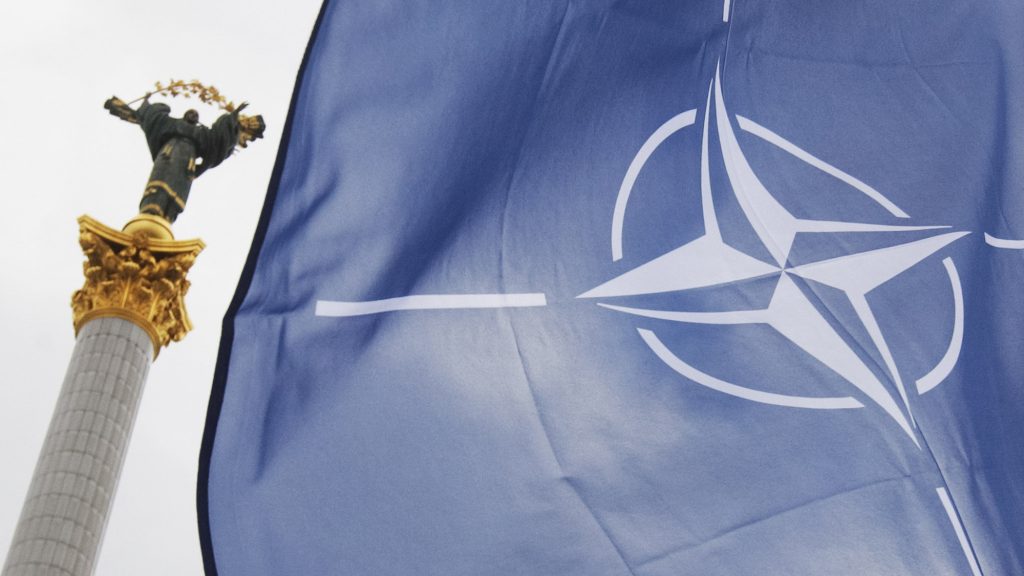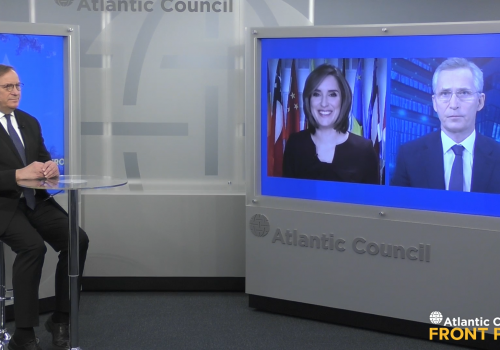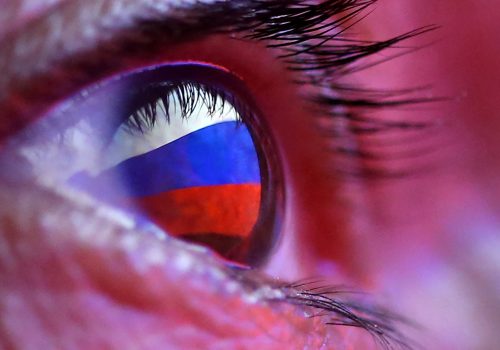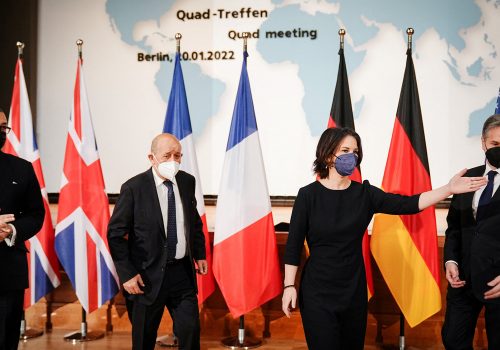After the disastrous abandonment of Afghanistan, after years of bickering over the 2 percent of gross domestic product target for defense spending, and after French President Emmanuel Macron deemed the Alliance brain dead, NATO is front and center on the geopolitical stage and reclaiming relevance in the current cacophony. On June 29 and 30, the Alliance will meet in Madrid with two major issues on the agenda: the upcoming expiration of the Secretary General’s mandate on October 1 this year and the articulation of a new Strategic Concept, an outline of action that allies typically establish every ten years, though the current one was released in 2010.
It is therefore time to go above the noise and take stock of NATO’s purpose—created by the 1949 North Atlantic Treaty—and the philosophy that conceived it. General Lord Hastings Ismay, NATO’s first Secretary General, is credited with coining the often-repeated shorthand description of the project’s raison d’être when he first took office in 1952: “Keep the Russians out, the Americans in, and the Germans down.” In other words, in the face of Soviet expansionism, rebuild the continent by avoiding the resurgence of nationalist militarism in Europe. This endeavor convinced US President Harry S. Truman to, instead of bringing US troops back home as soon as hostilities ended, consolidate their presence in Europe. In keeping with the architecture for peace developed after World War II, the United States bet on Europe—and Europe bet on the protection offered by Washington.
The will of the twelve North Atlantic Treaty signatories (ten European countries plus Canada and the United States) was to advance the architecture of the international liberal system. With express mention of the recently formed United Nations, the preamble could not be clearer: Its founding impulse is to bring together countries founded on “democracy, individual liberty, and the rule of law” in order to “promote stability and well-being in the North Atlantic area.”
Both a political and military partnership, NATO is focused on collective defense, as touted in Article 5 of its founding treaty, which clearly states, “if such an armed attack occurs, each of [the members]… will assist the Party or Parties so attacked by taking forthwith… such action as it deems necessary, including the use of armed force, to restore and maintain the security of the North Atlantic area.”
Afghanistan has been a topic of almost constant conversation in the past year, owing to the United States’ haphazard departure in August 2021 with some NATO allies saying they weren’t consulted. But in the hubbub of August’s events, a crucial fact was forgotten: NATO allies had been in Afghanistan since the first (and only) time that Article 5 has been invoked—following the September 11 attacks. Beyond being an attack on the United States, 9/11 represented a challenge to the very core of the North Atlantic Treaty: democracy and the multilateral order. And it forced NATO allies to develop an awareness of the potential for new, unconventional threats—that is, those outside traditional warfare.
Just as the beginning of the Afghanistan operation marked a symbolic milestone, so, too, did its end. While former President Donald Trump damaged the image of the US presidency in the eyes of the world, those who hated the United States still had a general respect for the White House. However, since the scenes from Kabul’s airport, Washington has been perceived as an unreliable partner shedding its Atlantic ties to concentrate on the Indo-Pacific: Some fear it is evidence of its abdication of global leadership. But the United States’ ability to respond to global challenges and the integration of values in its foreign policy should not be underestimated. After all, Uncle Sam has bounced back from other difficult situations in recent history—Vietnam comes to mind.
In that vein, the United States’ and NATO’s coordinated responses to Russian President Vladimir Putin’s December 17 ultimatum offer Moscow a serious and in-depth dialogue on arms control and strategic stability, but proclaim transatlantic commitment and steadfastness; a resounding rejection of Russian demands; and reaffirmation of the centrality of the principles of sovereignty, the inviolability of borders, and territorial integrity. They direct the Kremlin to refrain from the threat and use of force. Finally, and critically, both reiterate countries’ right to choose or change their security arrangements—to decide their future without external interference. This right is laid out in NATO’s well-known Open-Door Policy which prompted one of Putin’s classic responses of convolution: “They say—a policy of ‘open doors.’ Where did it come from? NATO has an open-door policy. Where is it stated? Nowhere.”
As for Europeans, the situation in Ukraine has made internal contradictions come to a head. From the outset, the European Union (EU) has been largely absent from the dialogue with Moscow, barring Macron’s bravado-riven bilateral conversations and his insights into the “contemporary traumas of this great people [Russians] and great nation.” Europe’s energy has been focused on grandiloquent speeches (unsurprisingly, primarily in French) and pompous formulas: while “strategic autonomy” loses momentum in Brussels talks, the term “Strategic Compass” is gaining ground after the European Council promised to adopt—within six weeks—what it has described as a road map to turning the Union into a more effective international security actor by 2030 and to strengthening its strategic sovereignty. Per a lesson from Aesop’s Fables, the mountain will give birth to another mouse—unless there is a miracle here, this speech promising great things will amount to little.
Europeans do not perceive danger in the same way across the board for historical and geographic reasons. Furthermore, there is the concerning about-facing—such as Hungarian Prime Minister Viktor Orbán’s recent visit to Moscow and his statements that Putin’s requests for security guarantees are “normal” despite the fact that they include proposals to block NATO weapons and forces from NATO members who joined after 1997, which includes Hungary. Allies also have to face the weakening of the democratic link within the organization, and particularly within the EU. Finally, Europeans have not accepted that defense must be paid for. All of the above serves as a backdrop for pessimistic outbursts such as Macron’s.
The Kremlin has spent years toward Putin’s objective of undermining the West but, more specifically, Europe and its future—the democratic system. And Putin makes no attempt to hide it with his litany of aggressive statements, weaponization of energy, Russo-Georgian war in 2008, and invasion of Crimea in 2014. But Ukraine seems to be the straw that broke the camel’s back. Procrastination in the face of “gradualism” is not a solution for NATO. It is time for an analysis of the range of Russia’s capabilities that the current situation has confirmed: misinformation, hybrid attacks, new technologies (including cyberattacks), “little green men,” and mercenaries. Those are gray areas that the Strategic Concept will have to clarify due to their impact on the interpretation of Article 5.
In addition to the risk posed by non-state actors and terrorism, the working hypothesis in the run-up to the NATO meeting in Madrid is that tension with Russia will not disappear soon (regardless of the outcome of the current crisis), underscoring the need for a solid defense and reach to the east, and a realistic approach in the Mediterranean and Africa. Likewise, Europeans must develop a common policy towards China: In a dialogue organized by the Atlantic Council, NATO Secretary General Jens Stoltenberg highlighted both the need for North America and Europe to maintain unity in the face of new threats, as well as the challenge of addressing “the security consequences of the rise of China.”
Putin, in his efforts to destroy the liberal international order, has shaken the foundations of NATO. It would be ironic—and welcome—for the crisis over Ukraine to reinvigorate the Alliance.
A version of this article originally appeared in El Mundo. It has been translated from Spanish by the staff of Palacio y Asociados and is reprinted here with the author’s and publisher’s permission.
Ana Palacio is a former minister of foreign affairs of Spain and former senior vice president and general counsel of the World Bank Group. She is also a visiting professor at the Edmund E. Walsh School of Foreign Service at Georgetown University and a member of the Atlantic Council’s Board of Directors.
Further reading
Fri, Jan 28, 2022
NATO chief on Russia crisis: We’re ready for anything
New Atlanticist By
NATO Secretary General Jens Stoltenberg believes the Alliance is fully prepared for the Kremlin's next move.
Wed, Feb 2, 2022
Even after the crisis over Ukraine, the West won’t be able to rest
New Atlanticist By
It is time for the West to take its head out of the sand and to take measure of the potential global consequences of this crisis.
Thu, Jan 20, 2022
How Europe can reclaim its voice in the Russia crisis
New Atlanticist By
“There will be no peace in Europe if the States are reconstituted on the basis of national sovereignty.” This warning by Jean Monnet sums up the crisis Europe is currently experiencing nearly eighty years later.
Image: NATO flag flies in front of the Independence monument at the Independence Square in Kyiv, Ukraine. Photo by STR/NurPhoto.



